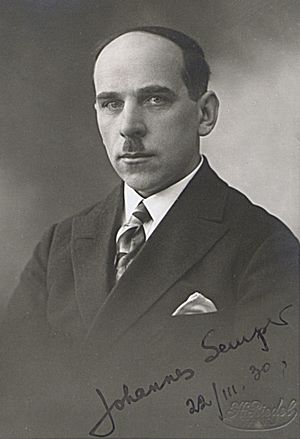Johannes Semper facts for kids
Johannes Semper (born March 22, 1892 – died February 21, 1970) was an important Estonian person. He was a talented poet, a writer, and a translator. He also played a part in politics during a significant time in Estonian history.
Contents
Who Was Johannes Semper?
Johannes Semper was a well-known figure in Estonia during the 20th century. He was famous for his creative writing, including poems and stories. He also helped people understand books from other languages by translating them into Estonian. Besides his work with words, he was involved in the government of Estonia.
Early Life and Learning
Johannes Semper was born in a place called Pahuvere, which is in Viljandi County, Estonia. From a young age, he showed a great interest in learning. He went to the University of Tartu, which is a very old and respected university in Estonia. He studied hard and later became a famous scholar there. A scholar is someone who studies a lot and knows a great deal about a particular subject.
A Life of Words: Writing and Translating
Throughout his life, Johannes Semper used his skills with language to create many works. He wrote beautiful poems that expressed feelings and ideas. He also wrote stories and other literary pieces. His work as a translator was very important because it allowed Estonian readers to enjoy books and ideas from other cultures. He helped bridge the gap between Estonian literature and the rest of the world.
Johannes Semper in Politics
Besides his writing, Johannes Semper also took on political roles. In 1940, when the Soviet Union took control of Estonia, he was briefly chosen to be the Minister for Education. This meant he was in charge of schools and learning for the whole country. Later, he also wrote the words for the Anthem of Estonian SSR, which was the official song for Estonia during the time it was part of the Soviet Union.
His Legacy
Johannes Semper passed away in Tallinn, the capital city of Estonia, on February 21, 1970. He left behind a rich collection of writings and a history of public service. His contributions to Estonian literature and his role in the country's political life make him a notable figure in Estonian history.
 | Delilah Pierce |
 | Gordon Parks |
 | Augusta Savage |
 | Charles Ethan Porter |


